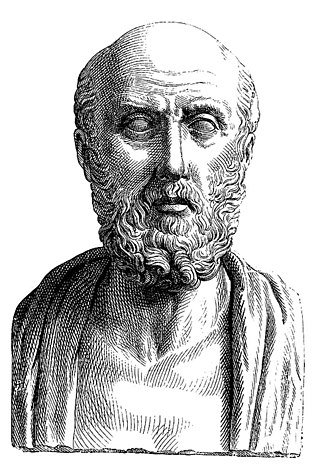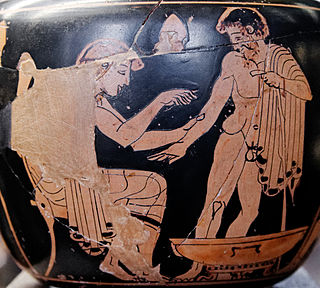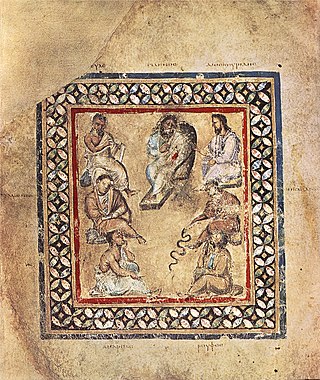
Laurence Totelin (FRHistS) is a historian of Greek and Roman science, technology, and medicine. She is professor of ancient history at Cardiff University.

Laurence Totelin (FRHistS) is a historian of Greek and Roman science, technology, and medicine. She is professor of ancient history at Cardiff University.
Totelin received her MPhil from the University of Cambridge in 2002. Her thesis was Recipes of mithridatium in Antiquity and the Middle Ages: Towards an Anthropology of Antidotes. [1] She was awarded her PhD from University College London in 2006. Her doctoral thesis was Hippocratic Recipes: Oral and Written Transmission of Pharmacological Knowledge in Fifth- and Fourth Century Greece. [2]
Totelin specialises in pharmacology, botany and gynaecology in antiquity. She has written and edited books on ancient botany and ancient medicine. She has co-edited three Festschriften, for Elizabeth Craik, Vivian Nutton, and Liba Taub. As well as academic research, Totelin writes for public-facing audiences such as The Conversation, and writes a blog, Concocting History. [3] [4]
Totelin is a Fellow of the Royal Historical Society and a Fellow of the Linnean Society. [5]

The Hippocratic Oath is an oath of ethics historically taken by physicians. It is one of the most widely known of Greek medical texts. In its original form, it requires a new physician to swear, by a number of healing gods, to uphold specific ethical standards. The oath is the earliest expression of medical ethics in the Western world, establishing several principles of medical ethics which remain of paramount significance today. These include the principles of medical confidentiality and non-maleficence. As the seminal articulation of certain principles that continue to guide and inform medical practice, the ancient text is of more than historic and symbolic value. It is enshrined in the legal statutes of various jurisdictions, such that violations of the oath may carry criminal or other liability beyond the oath's symbolic nature.

Sumac or sumach is any of about 35 species of flowering plants in the genus Rhus and related genera in the cashew family (Anacardiaceae). Sumacs grow in subtropical and temperate regions throughout every continent except Antarctica and South America. Sumac is used as a spice, as a dye, and in medicine.

Pedanius Dioscoridesc. 40–90 AD, known as "the father of pharmacognosy", was a Greek physician, pharmacologist, botanist, and the author of De materia medica, a five-volume Greek encyclopedic pharmacopeia about herbal medicine and related medicinal substances, that was widely read for more than 1,500 years. For almost two millennia Dioscorides was regarded as the most prominent writer on plants and plant drugs.

The Hippocratic Corpus, or Hippocratic Collection, is a collection of around 60 early Ancient Greek medical works strongly associated with the physician Hippocrates and his teachings. The Hippocratic Corpus covers many diverse aspects of medicine, from Hippocrates' medical theories to what he devised to be ethical means of medical practice, to addressing various illnesses. Even though it is considered a singular corpus that represents Hippocratic medicine, they vary in content, age, style, methods, and views practiced; therefore, authorship is largely unknown. Hippocrates began Western society's development of medicine, through a delicate blending of the art of healing and scientific observations. What Hippocrates was sharing from within his collection of works was not only how to identify symptoms of disease and proper diagnostic practices, but more essentially, he was alluding to his personable form of art, "The art of true living and the art of fine medicine combined." The Hippocratic Corpus became the foundation upon which Western medical practice was built.

Ancient Greek medicine was a compilation of theories and practices that were constantly expanding through new ideologies and trials. The Greek term for medicine was iatrikē. Many components were considered in ancient Greek medicine, intertwining the spiritual with the physical. Specifically, the ancient Greeks believed health was affected by the humors, geographic location, social class, diet, trauma, beliefs, and mindset. Early on the ancient Greeks believed that illnesses were "divine punishments" and that healing was a "gift from the Gods". As trials continued wherein theories were tested against symptoms and results, the pure spiritual beliefs regarding "punishments" and "gifts" were replaced with a foundation based in the physical, i.e., cause and effect.

Medicine in ancient Rome was highly influenced by ancient Greek medicine, but also developed new practices through knowledge of the Hippocratic Corpus combined with use of the treatment of diet, regimen, along with surgical procedures. This was most notably seen through the works of two of the prominent Greek physicians, Dioscorides and Galen, who practiced medicine and recorded their discoveries. This is contrary to two other physicians like Soranus of Ephesus and Asclepiades of Bithynia, who practiced medicine both in outside territories and in ancient Roman territory, subsequently. Dioscorides was a Roman army physician, Soranus was a representative for the Methodic school of medicine, Galen performed public demonstrations, and Asclepiades was a leading Roman physician. These four physicians all had knowledge of medicine, ailments, and treatments that were healing, long lasting and influential to human history.

Mithridates or Mithradates VI Eupator was the ruler of the Kingdom of Pontus in northern Anatolia from 120 to 63 BC, and one of the Roman Republic's most formidable and determined opponents. He was an effective, ambitious and ruthless ruler who sought to dominate Asia Minor and the Black Sea region, waging several hard-fought but ultimately unsuccessful wars to break Roman dominion over Asia and the Hellenic world. He has been called the greatest ruler of the Kingdom of Pontus. He cultivated an immunity to poisons by regularly ingesting sub-lethal doses; this practice, now called mithridatism, is named after him. After his death, he became known as Mithridates the Great.

Metrodora was possibly the author of an ancient Greek medical text, On the Diseases and Cures of Women. She is known from a single Byzantine manuscript. The manuscript, in the collection of the Laurentian Library in Florence, is a collection of writings on medical topics; the first part, attributed to Metrodora, focuses on obstetrics and women's medicine.
The history of herbalism is closely tied with the history of medicine from prehistoric times up until the development of the germ theory of disease in the 19th century. Modern medicine from the 19th century to today has been based on evidence gathered using the scientific method. Evidence-based use of pharmaceutical drugs, often derived from medicinal plants, has largely replaced herbal treatments in modern health care. However, many people continue to employ various forms of traditional or alternative medicine. These systems often have a significant herbal component. The history of herbalism also overlaps with food history, as many of the herbs and spices historically used by humans to season food yield useful medicinal compounds, and use of spices with antimicrobial activity in cooking is part of an ancient response to the threat of food-borne pathogens.

De materia medica, On Medical Material, is a comprehensive pharmacopoeia on medicinal plants and the medicines derived from them. Written between 50 and 70 CE by Pedanius Dioscorides, a Greek physician in the Roman army, this five-volume encyclopedia became the foremost reference on herbal medicine for over 1,500 years. Its extensive use across Europe and the Middle East until the Renaissance, when it was gradually replaced by revised herbals, makes it one of the most enduring texts in the history of natural history and pharmacology.

Liba Taub is an American historian of science, now Curator of the Whipple Museum in Cambridge, UK.
Antonius Castor was a pioneering botanist and pharmacologist of ancient Rome who lived in the first century. He is several times quoted and mentioned by Pliny the Elder, who considered him the greatest authority on his subjects.
The Diploma in the History of Medicine of the Society of Apothecaries, abbreviated DHMSA, is a postgraduate qualification awarded following a one-year study course in the History of Medicine, organised by the Worshipful Society of Apothecaries and covers topics from antiquity of humanity to present times, taught by expert historians and clinicians.
Iatrosophia is a genre of Greek medical literature, originating in Byzantium. It comprises medical handbooks containing recipes or therapeutic advice, but the term can also be used of orally transmitted medical knowledge.

Crateuas, also known as Cratevas (Latin), Krateuas, or Kratevas, was a Greek doctor and pharmacologist. He was distinguished from others of the same name by the epithet "Rootpicker" or "Rhizotomist" after the Greek name of his principle work, the Herbology.

The Alexandria School of Medicine is one of the oldest empirical educational institutions in the history of medicine initiated during the Hellenistic period in the city of Alexandria. At one historical juncture, in Egypt, they united all the different medical doctrines that originated in the East and in Alexandria, and merged into one universal "critical mass of knowledge" the Alexandrian empirical school. As the Alexandria School grows more developed Medical Schools in Knossos and in Knidos over time lost their meaning and significance.
Cleopatra the Physician was a Greek medical writer and author of a manual entitled Cosmetics. Six fragments of her Cosmetics survive in quotation from later medical writers.
Aristophilus was an ancient Greek pharmakopōlēs, an ancient occupation that today would probably be translated as "druggist", "remedy seller", or "apothecary".
Rebecca Flemming is a Classicist. She holds the inaugural A.G. Leventis Chair as Professor of Ancient Greek Scientific and Technological Thought at the University of Exeter.
Marcus Artorius Asclepiades was physician of ancient Rome of the Artoria gens who was one of the followers of Asclepiades of Bithynia, and afterwards became the physician of the Roman emperor Augustus. The historian Plutarch even describes Artorius and Augustus as having been friends (philoi). He was said in some sources to have had several other very notable patients such as Mark Antony, Marcus Licinius Crassus, and Cicero.